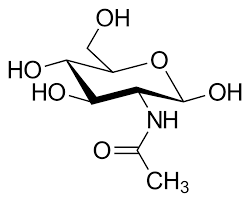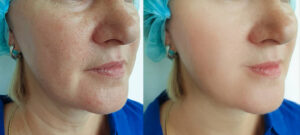Acetyl glucosamine, a compound derived from glucose and an amino acid called glutamine, has been gaining attention in the world of skincare for its potential benefits. While it might not be as well-known as some other skincare ingredients, such as hyaluronic acid or retinol, acetyl glucosamine has been shown to offer a range of advantages when incorporated into your skincare routine.

What Is Acetyl Glucosamine?
Acetyl glucosamine is a naturally occurring compound found in the body, and it plays a vital role in various physiological processes. It is a derivative of glucosamine, which is commonly known for its role in joint health. Acetyl glucosamine is essentially a modified form of glucosamine, where an acetyl group is attached to the glucosamine molecule. This modification enhances its stability and skin-related properties.
Read Also: Retinol: Your Key to Youthful Skin
One of the primary functions of acetyl glucosamine is its involvement in the synthesis of hyaluronic acid, a key component of the skin’s extracellular matrix. Hyaluronic acid is responsible for maintaining the skin’s hydration and suppleness. As we age, the production of hyaluronic acid in the skin decreases, leading to dryness, fine lines, and a loss of elasticity. Acetyl glucosamine can help address this issue by promoting the production of hyaluronic acid.
Benefits of Acetyl Glucosamine for the Skin Hydration:

Acetyl glucosamine’s ability to boost hyaluronic acid production makes it an excellent ingredient for maintaining skin hydration. Hyaluronic acid has a remarkable capacity to retain water, and when the skin has an adequate supply of it, it appears plump, dewy, and well- moisturized.
Anti-Aging: Proper skin hydration is crucial for combating the signs of aging. Well-hydrated skin appears smoother and more youthful. Additionally, acetyl glucosamine may have antioxidant properties that help protect the skin from oxidative stress, which can lead to premature aging.
Hyperpigmentation Reduction: Acetyl glucosamine has been studied for its potential to reduce the appearance of hyperpigmentation and dark spots. It works by inhibiting the production of melanin, the pigment responsible for skin color. By doing so, it can help fade dark spots and even out skin tone.
Enhanced Skin Barrier: A healthy skin barrier is essential for protecting against environmental stressors and maintaining moisture. Acetyl glucosamine supports the skin barrier by promoting the production of essential skin lipids and ceramides.
Wound Healing: Some research suggests that acetyl glucosamine may aid in wound healing by stimulating the skin’s natural repair processes. This can be particularly beneficial for those with skin injuries or post-inflammatory hyperpigmentation.

Gentle Exfoliation: Unlike more aggressive exfoliants like alpha hydroxy acids (AHAs) or beta hydroxy acids (BHAs), acetyl glucosamine offers gentle exfoliation. It helps remove dead skin cells from the surface without causing irritation, making it suitable for those with sensitive skin.
Read Also: Discover the Magic of Hyaluronic Acid
Collagen Support: Acetyl glucosamine may support collagen production, which is essential for maintaining skin elasticity and firmness. By preserving collagen levels, it can contribute to a more youthful complexion.
How to Use Acetyl Glucosamine in Your Skincare Routine

Acetyl glucosamine is a versatile ingredient that can be incorporated into your skincare routine in various ways: Look for serums or essences that contain acetyl glucosamine as a key ingredient. These products are typically formulated to deliver the active ingredient directly to your skin. Apply the serum after cleansing and toning, but before heavier creams or oils. You can find moisturizers that include acetyl glucosamine in their formulations. These products are suitable for daily use and can help lock in moisture while providing the benefits of acetyl glucosamine. If you have specific areas of hyperpigmentation or dark spots, you can apply a concentrated acetyl glucosamine spot treatment directly to those areas. This targeted approach can be effective for fading localized pigmentation issues. Acetyl glucosamine is generally well- tolerated and can be used in conjunction with other skincare ingredients. You can layer it with other serums or treatments as part of your skincare routine. Always finish your morning skincare routine with a broad-spectrum sunscreen with at least SPF 30. Sunscreen is essential to protect your skin from UV damage and prevent further hyperpigmentation.
Read Also: Harnessing the Magic of Alpha Arbutin
Precautions and Considerations
While acetyl glucosamine is considered safe for most skin types, it’s essential to keep a few precautions and considerations in mind: Before using any product containing acetyl glucosamine, especially if you have sensitive skin, perform a patch test. Apply a small amount of the product to a discreet area of your skin and monitor for any adverse reactions. If you have known allergies to shellfish, consult the product’s ingredient list before using acetyl glucosamine, as it is derived from chitin, a component found in shellfish shells. Most skincare products use synthetic, or bio fermented sources of acetyl glucosamine, but it’s always best to double-check. For best results, consistency is key. Incorporate acetyl glucosamine into your daily skincare routine and be patient as it may take several weeks to see noticeable improvements in your skin. If you have specific skin concerns, conditions, or questions about using acetyl glucosamine, consult a dermatologist or skincare professional. They can provide personalized recommendations based on your unique needs.

Hence, acetyl glucosamine is a versatile and effective skincare ingredient that offers a range of benefits for the skin. Whether you’re looking to improve hydration, reduce hyperpigmentation, support your skin’s barrier function, or address the signs of aging, acetyl glucosamine can be a valuable addition to your skincare routine. When used consistently and as part of a well-rounded skincare regimen, it can help you achieve a healthier, more radiant complexion. As with any skincare product, it’s essential to choose products that suit your skin type, perform patch tests when necessary, and consult a dermatologist for personalized guidance if needed.
